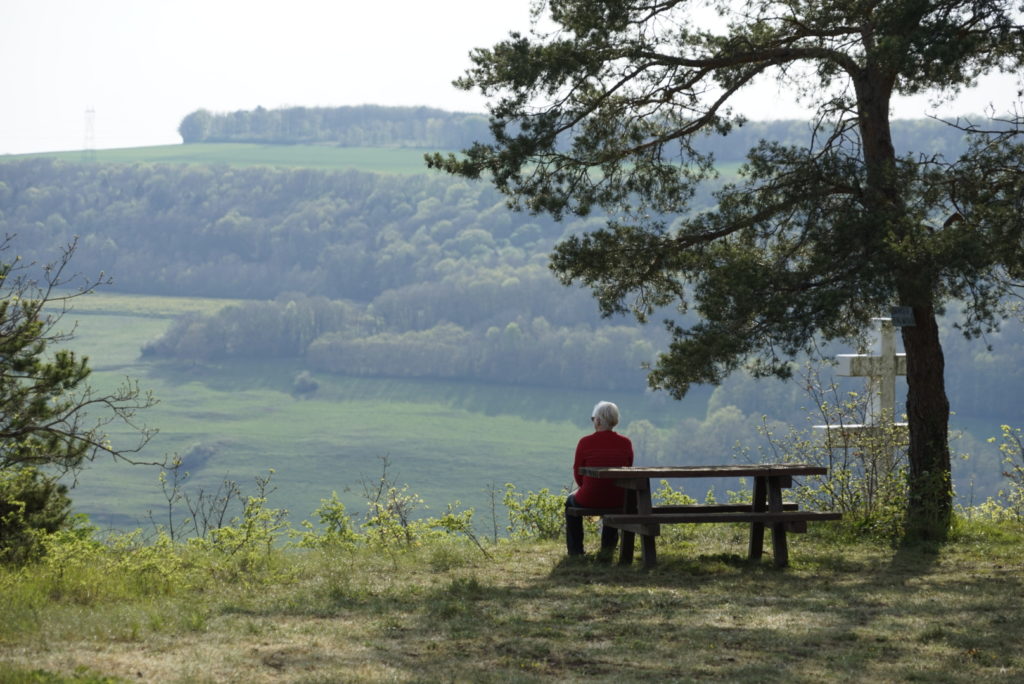
“FYI: It’s possible I’ve got COVID-19.”
The text message, via Signal, arrived a while back from my son Brendan, huddled in his apartment in Phnom Penh, 6,200 miles away from our home in the rural French countryside. As my heart skipped a few beats and I tried to beat back the panic, he described a classic set of COVID symptoms: persistent headache, persistent fever, dry cough, relentless fatigue.
His partner, Leakena, had been suffering the same symptoms, which started a couple of days after she started working her UN job from home, and a few days before Brendan got sick. She remembered that her co-worker, with whom she shared air and a desk in the week leading up to the work-from-home directive, had declared one day that she had suddenly lost her sense of smell – a symptom that nobody at the time knew was textbook COVID. Since that time, her friend had gotten sicker, and so had she.
So, yeah. Although testing in Cambodia is difficult to come by, it was pretty clear they both had COVID-19, about the scariest virus most of us have seen in our lifetimes.
As I quizzed Brendan about the important details, like breathing problems (none) and which hospital he would go to (the private one, but they might send him to the big government quarantine hospital, which would be bad), the rational and emotional sides of my brain began a silent, heated debate.
“He’s 28 years old. He’ll fight it off easily.”
“Unless he’s one of the unlucky young people who doesn’t.”
“Come on, who do you know that young who died of COVID?”
“Well, there’s the Chinese doctor in that story in the New York Times yesterday. And those young people dying of COVID strokes.”
“But he’s healthy and strong.”
“So was that Chinese doctor. And Brendan had asthma as a kid.”
And on it went, the fear doing what it’s always good at, overwhelming the rationality.
If there’s one thing this virus is really, really good at, it’s generating fear.
The situation in the world didn’t help matters much, either. Brendan is insured for medical evacuation, so that if he gets really sick, he can be whisked off to a top-flight hospital in Bangkok or Singapore.
But I knew that if Brendan needed hospitalization now, there would be no evacuation. There might be no ventilator, or even a critical care doctor available to treat him. That was the real crux of it: having a sick child in a substandard health care system, with international borders sealed.
My son was on his own.
Brendan texted that he was really tired, and was going to bed. He’d keep me updated. We said our good-nights, and I-love-yous, and signed off.
And that’s when the tears came. I was overwhelmed by the frustration and powerlessness that I felt, that we all sometimes feel, in the face of this pandemic.
Over the next several days of Brendan’s persistent fevers, headaches and oscillating fatigue, I thought that once again, we are living through an event that will forever define a before-and-after period in time. It is too soon to tell what changes we will find on the other side. But it’s going to be a different world, and we’re going to behave differently in it. If we’re smart.
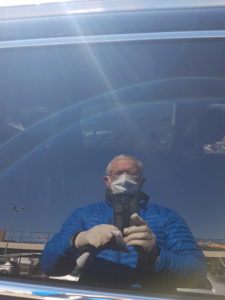
grocery shopping.
As Paula and I sit at home, passing through the biblically notable 40th day and 40th night of the lockdown, we share a fate with billions of others across the planet. All of our fellow humans are suffering lockdowns, isolation, fear, illness, loss. And as is always the way in the world, those with less suffer more.
It’s pretty clear that the world will never be the same. What seems to be the big question people ponder, as they sit in their sweatpants on their couches Zooming the day’s business meetings and family chats, is whether it’s going to be worse or better. In the end, it will be up to us humans to decide.
But pondering such questions requires one to spend a lot of time thinking about the future. And I’ve come to view the pandemic as an opportunity to get better at living in the present. When you are determined to do everything in your power to avoid this nasty virus, and you don’t know if a vaccine comes in 12 months, or 18, or 24, it’s really not fruitful to think too far ahead.
The present “confinement” for Paula and me lacks the sting faced by those in tiny apartments in Paris, Berlin, Madrid, and New York. But we’re unlikely to leave the confines of France anytime soon. So we might as well settle into the Now. Which of course is what all those annoying mindfulness experts have been trying to tell us all along is the route to true happiness.
We’ll see.
The French have been stone cold serious about their lockdown rules, which are much more strict than they are in the U.S. The list of reasons for being out of the house (groceries, doctor’s appointment, brief exercise, checking on an elderly neighbor, doing an essential job) are short, and require a signed, dated and time-stamped “attestation” explaining what you are doing out of the house. Paula and I can’t be in the car together. We can exercise near home together, and work in the garden. But that’s it. Police have issued hundreds of thousands of fines in the 175€ range for violations. One guy eating a solo picnic on a hill in a closed national park was spotted by drone and fined.
By and large, not counting the guy in the park, the French have accepted the rules with equanimity. They have been rewarded by a sharply flattened curve of new cases and deaths from the virus. On April 7, the French recorded nearly 9,000 new cases, and 1,400 deaths. Seventeen days later, there are 1,600 new cases, and 380 dead. The health care system has kept up, although the government did move patients, using specially designed high-speed hospital trains, from the overwhelmed northeast around Strasbourg and Alsace and Champagne to the lightly affected western regions that could handle the increase.
It hasn’t been perfect. But it has worked, and the French generally give their president and their national government high marks for sound, sober, science-based management of the crisis, as well as compassion.
Right now, the government is hard at work on new regulations likely to take effect on May 11 that will allow parts of the economy to start gearing up again, while maintaining social distancing, and suppressing gatherings of all but the smallest groups of folks.
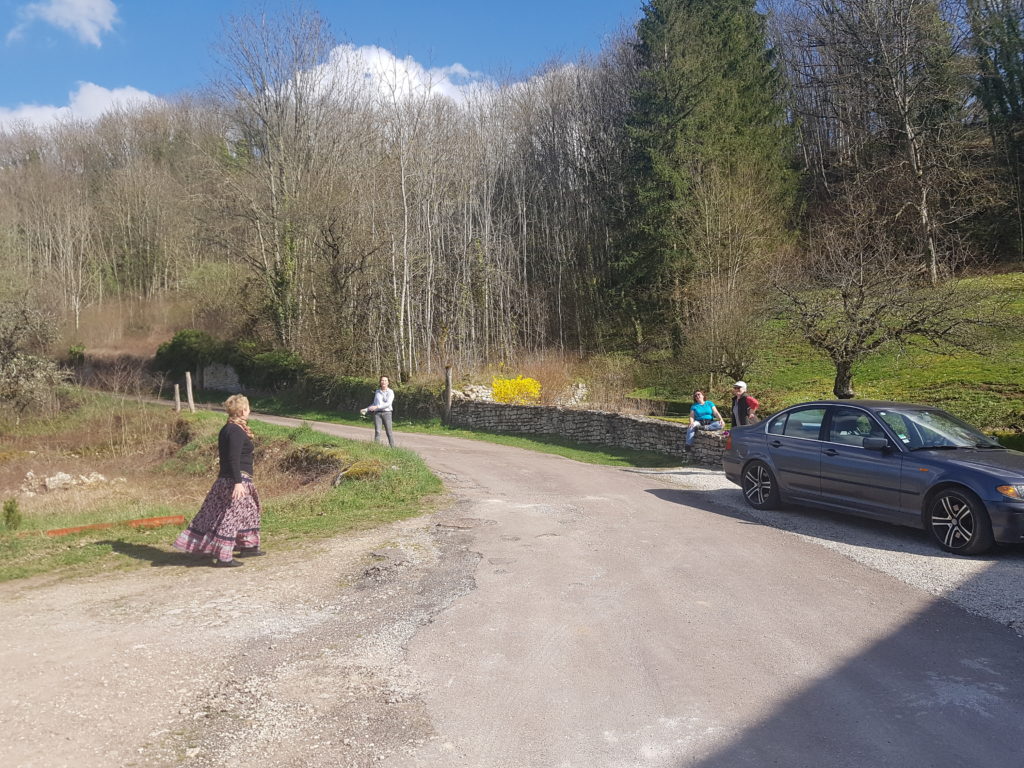
For our part, we’re hoping for two small but significant changes come May 11. First, we’d like to be able to go places in the car together again without running afoul of the law. And second, we want to ride our bikes, an activity that up until now has been prohibited.
The driving thing is huge. Since I’ve taken on the responsibility of doing the grocery shopping for us (or as I call it, going into battle with the virus), Paula finds herself with some pretty serious cabin fever, and a desire for some wide-open spaces. The other day we drove a half a mile down the hill to return a borrowed roto-tiller. The look on Paula’s face made me think she was about to stick her head out the window, tongue flapping in the wind, and start barking for joy.
We’re all figuring out now why dogs are so happy to go for a ride.
The one time we “broke the rules,” and took groceries to some dear friends of ours who we really want to keep out of the grocery store, we took the back roads across the hills and valleys of the Auxois. Just driving across this gorgeous countryside for 20 minutes on a sunny afternoon was transcendent.
As for the bicycles, the ability to pedal along the Bourgogne Canal, scarcely three kilometers from the house, is one of the great joys of our spring and summer.
Despite these desires to move around more freely, both Paula and I remain very much in fear of the virus. We are not so old and unhealthy that getting it would be an automatic death sentence. But we are not so young that surviving it would be a sure thing. Far from it. For myself, the fact that I’m male, and suffer from hypertension (easily controlled with medication, if I’m not fighting a deadly virus), are two strikes against me.
All of which is to say, we want nothing to do with it, and so our own personal lockdown is likely to last long past any government requirements. It’s difficult to imagine traveling again before there’s a vaccine.
Which is why going to the grocery store is such an ordeal. It involves gloving up, putting on a mask, carrying hand sanitizer, wiping down the basket with a bleach wipe, and generally behaving as if I’m heading into open-heart surgery.
I saw an Instagram photo today from a National Geographic photographer in which he, too, was gloving and masking up and grabbing his hand sanitizer to head to the grocery store. He’s in Kuala Lumpur, Malaysia.
We are indeed in it together.
The last time I was in the store, an unmasked guy got way too close for way too long, and I found myself angry, and also frustrated that I didn’t have the French vocabulary to tell him to back the fuck off.
So we spent part of our next Zoom French lesson with our professor going over what to say to a COVIDIOT who won’t respect proper distancing. “N’importe quoi!” was a favorite, followed by “Gardez votre distance, s’il vous plait.”
I suggested “Connard!”, which means asshole. But my French professor thought that might lead to a fist fight at the checkout. I told her I thought I could have taken the guy. But she pointed out that fisticuffs are frowned upon as a social distancing strategy. Which is a fair point.
This week, we’re trying our supermarket’s shop-online feature that allows me to drive through and pick up our order. You can’t get everything online, so I’ll still go into the store for a few things. But it will reduce my exposure by a large margin. Unlike services like Instacart in the U.S., the people who do the shopping are store employees. Our market started this service a few years back, so it’s already a perfected system.
Our strangest and saddest day during the lockdown so far came about two weeks in, when we experienced a pandemic funeral. Our friend Horst died, not from COVID-19, but from cancer. Still, the cruelty of the virus hung over this heart-rending funeral in every way. The limit on participants was 20, which meant that Eve, Horst’s widow and our dear friend, could invite only 19 guests to her husband’s funeral.
Everyone had to wear masks and gloves. Everyone had to stay two meters apart. There was a moment in the funeral home parking lot where we all looked like extras from a a sci-fi thriller about a runaway virus: 20 somber people, all in masks and gloves, standing 10 feet apart?
At the small service, we occupied every other pew, to maintain our social distance. When we filed out at the end, Eve wept, alone, isolated amid the cruel reality of this relentless virus.
As Paula and I looked on helplessly, it occurred to me that human beings aren’t well-suited to the kind of behavior required by a pandemic. The whole art of being alone, staying isolated, not touching anyone, covering your face, avoiding hugs, avoiding face-to-face encounters – all of these things go against how we’re wired as a species. We understood why we couldn’t hug our grieving friend. And she understood as well. But that didn’t make it any less heartbreaking.
When we want to be cheered up, we turn to our garden, a precious 2,500-square-foot plot of French dirt outside the medieval walls on the edge of the village – a three-minute walk from our house. (It’s not a big village.)
When we were first looking at the cottage, and learned that it included the detached, stone-walled garden, Paula briefly contemplated how much we could get if we sold such a coveted plot. In fairness, at the time she said this, neither one of us were gardeners. The garden itself, untended for years, was a wreck, filled with wild blackberry brambles and weeds taller than we were.
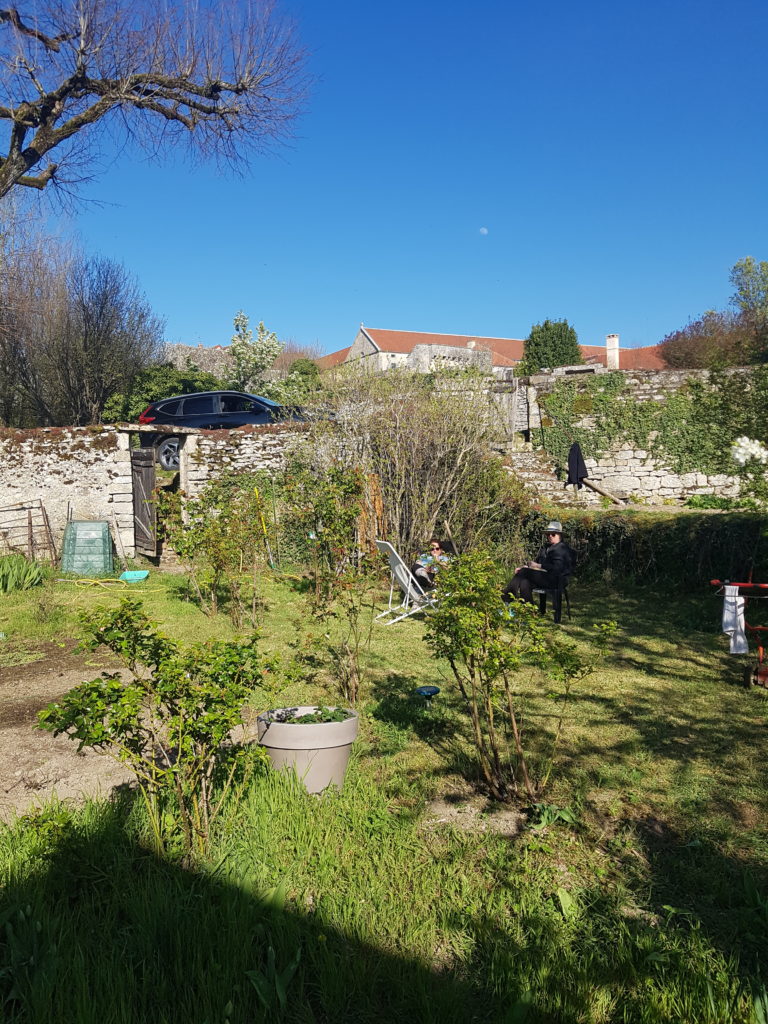
But as we stood there, what flashed in my mind – and this is absolutely true – was a time in the distant future where there might be global strife and economic collapse, and we would need to grow our own food.
“There’s no way we’re giving up this garden,” I said, thoughts of apocalypse dancing in my head.
I was so serious about it that we continued to neglect it for the next two years. We did pay a French gardener one year to clear it all out. He did a great job. Then we promptly went on a two-week vacation just as spring sprung, and by the time we got back it was overgrown again, and we folded like a pair of 2s.
After looking one day upon the re-wrecked plot, the gardener asked a friend of ours a question along the lines of, “What in the hell is wrong with those people?” Sure, he’d gotten paid. But the French have great pride in their work, and we had clearly not properly respected his. I think our French friend responded, “They’re Americans,” which seemed to require no further explanation.
Anyway, we aren’t going anywhere this spring. So with the help of our green-thumbed American friend Maud, who’s staying in her ancestral home on sabbatical, and after a visit last summer by Maud’s indefatigable landscaper friend Michael, we have a bona fide garden now. We’re not ashamed anymore when people walk by it.

The garden teaches a lot of life lessons. For example, to avoid feeling overwhelmed by all the work that needs doing, we try to do an hour or so of work every day. String together enough days, and this adds up pretty quickly. In that way, gardening is a lot like writing.
We’re still neophytes enough to regard most things that happen in the garden as little miracles. In the winter, we bought 50 tulip bulbs while we were in the Netherlands, brought them home and dutifully planted them in the cold dirt covering our pet cemetery.
Yet when they started popping out of the ground a couple of weeks ago, we thought it was magic. And maybe that’s something to hold onto in these hard times: the small miracles. Like watching plants spring up out of French dirt.
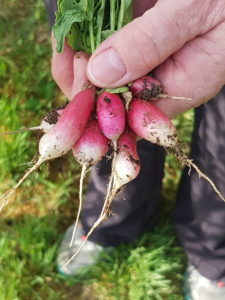
Of course, being from New Orleans, we always try to adapt any space we occupy into a drinking venue. So it would surprise none of our American friends to learn that we have placed chairs and a small table in the garden.
If you should visit us at 4, you’ll likely find us weeding and cutting and watering and tending to the needs of our young plot.
But should you drop by at 5:30, you’re more likely to see us sitting in our chairs, the golden light of a Bourgogne late afternoon filtering through the mirabelle tree, a half-empty bottle of champagne sitting on the table, and half-full glasses in our hands. What better way to admire nature’s wonders?
And so the days pass, one much like the other. We can’t help but feel lucky. Brendan and Leakena got better. We can still take long walks in this countryside we love. And miracles still happen every day in the garden.
And sometimes out of it.
The other morning, I was working on one of the thousand household repair projects that have built up since the pandemic closed all the hardware stores. I had a grand workshop in America, but in France all my tools and hardware are huddled in a small, cramped corner, hidden behind a heavy velvet curtain in one of our two guest rooms downstairs.
As I dug through my toolbox, a flash of white caught my eye. Disinterring it from a stack of tools, I discovered an opened package of four N95 facemasks. I looked over at Oliver, our perpetually curious cat, who was eyeing me suspiciously from the bed, and I smiled.
“It’s going to be a good day.”

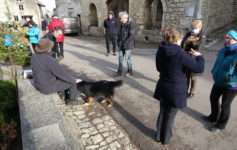

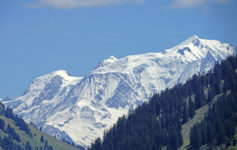
Bravo my friends!
A really nice read. COVIDIOT is inspired. If Trump is elected again I’m going ex-pat too.
Peace, Dayna
In France we say “ce qui ne tue pas nous rend plus fort”….so it willbe for your young adults in asia….and living the present moment as been my phylosophy since I got on Frisbee….riding around with my friends Paula and Maud is one the first think I am looking for after the lock down…take czre
hello James et Paula,
On a beau ne pas “être Américains” on ne s’y connait pas plus que vous en jardin, le nôtre est donc follement sauvage mais on l’aime… mais comme vous, on a découvert le miracle des tulipes ! Quelques bulbes offerts par Emmanuel à Noël, plantés comme indiqué sur le mode d’emploi (relu quatre à cinq fois) et hop, magique ! Ce sont des fleurs d’une gentillesse extrême.
Petite info pour le vélo : vous avez le droit d’en faire en solitaire pour aller chercher vos courses (ce qui permet de prendre son temps et d’aller assez loin) mais aussi pour vos loisirs, donc là à deux, dans la limite d’un rayon d’1 km et d’une heure, car RIEN NE L’INTERDIT sur le décret. Si vous aviez une prune (amende) elle serait contestable.
Merci pour ce blog, on le lit avec grand intérêt 🙂
Bon courage, portez-vous bien, et à bientôt !
Stéfani et Emmanuel des Tanneries
Beautifully written